When it comes to Greek mythology, there is a treasure trove of quirky and fascinating stories to be found. Goddesses born from clam shells, Hades kidnapping women, and lots of legends about unfaithful god husbands. But things get much stranger once you get past the more well-known myths. Yes, we’re talking about tales that fall into the straight-up creepy category. So, if you’re looking for 25 brief tales on creepy mythology, we’ve got exactly what you need. And if you only remember two things from these stories, we hope they are the following: Never provoke the gods in any way because they are easily angered, and don’t ever best them in a contest of any kind – they don’t like losing.
Here are 25 Creepiest Tales From Greek Mythology.

Circe
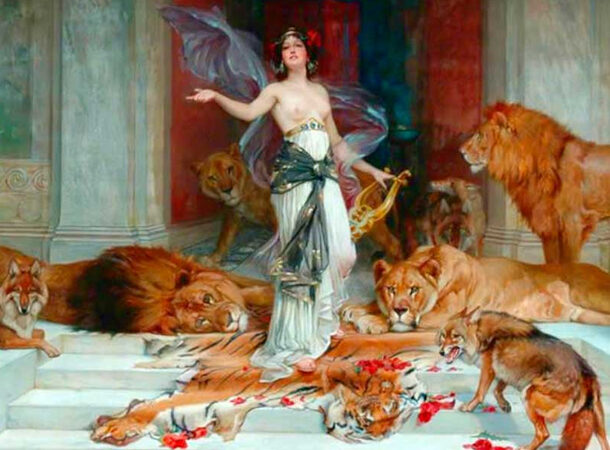 http://www.greekmythology.com/Other_Gods/Circe/circe.html
http://www.greekmythology.com/Other_Gods/Circe/circe.html The first entry on our list gives us serious “Game of Thrones” vibes. Circe was said to be the daughter of a titan. Living on the island of Colchys, she was well-versed in all manners of magic. When Odysseus and his men arrived, she invited them to a feast, which they gladly accepted despite the absence of their brave leader Odysseus. However, Circe fooled around with her magic instead of simply providing a nice meal and transformed the warriors into pigs. Odysseus learned of this and, with some words of warning from Hermes, proceeded to confront her about it. She confessed, apologized, turned the men back, and then… Odysseus apparently forgot about it as he and his warriors stayed and spent an entire year partying on the island instead of accomplishing their epic quest. In other narratives, Odysseus winds up in Circe’s bed and even has children with her.
Apollo and Daphne
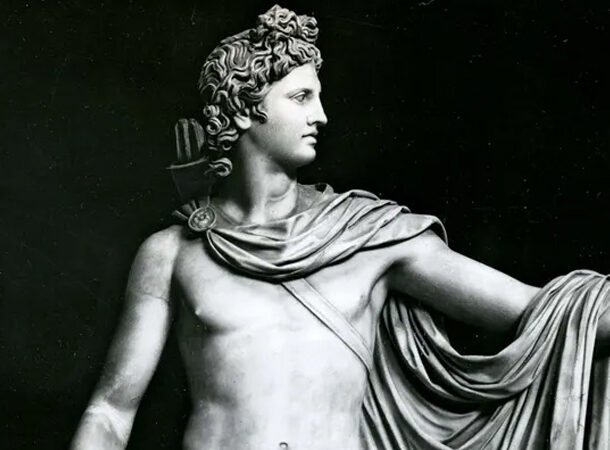 http://britannica.com/topic/Daphne-Greek-mythology
http://britannica.com/topic/Daphne-Greek-mythology Daphne was the daughter of Peneus, the river god. Apollo, the god of music and the Sun fell in love with Daphne, but she refused to have anything to do with him. Apollo was following Daphne around the woods one day, which frightened her. Desperate, she started crying for help, praying to both her father and the Earth, and she was instantly transformed into a laurel tree. When Apollo discovered that his love interest had been transformed into a plant, he severed one of her limbs and fashioned it into a wreath. He then wore it as a reminder of his affection for her. Obviously, this did not make the situation any better.
Sciron
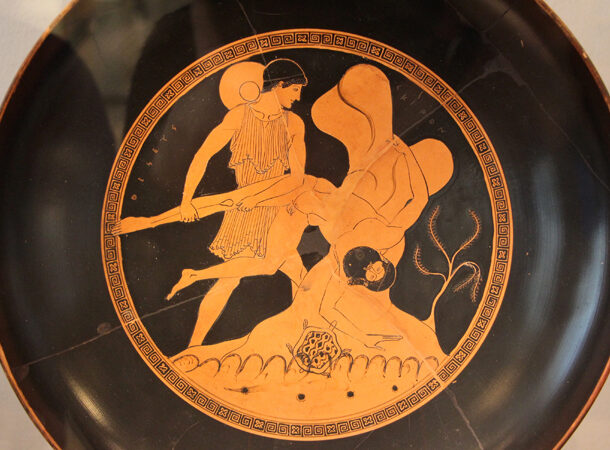 https://ancient-literature.com/sciron/
https://ancient-literature.com/sciron/ Of course, it wasn’t just the gods who were bullies. There is also the myth about a man named Sciron who enjoyed robbing people. He did this by approaching passing travelers and asking for help washing his feet. When they offered to help, he would kick them in the head and shove them off a cliff. A colossal tortoise at the bottom of the cliff would devour the remains, or the still-living, assuming the fall did not kill them. He did this repeatedly, killing an enormous amount of people. The hero Theseus eventually grew tired of Sciron’s antics and tracked him down, throwing him over the same cliff to be eaten by the tortoise.
Hades and Pirithous
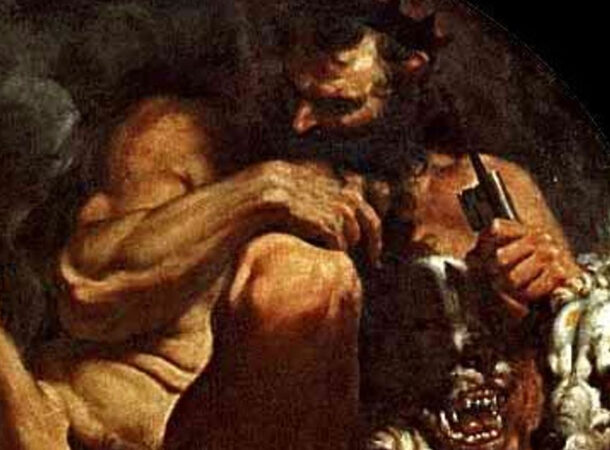 https://www.theoi.com/Khthonios/Haides.html#Peirithoos
https://www.theoi.com/Khthonios/Haides.html#Peirithoos In contemporary culture, the god of the underworld is frequently presented as Greek mythology’s supreme evil. Contrary to popular belief, Hades is actually one of the more sensible deities; in fact, when compared to his siblings Zeus and Poseidon, he may just as well be a saint. However, Hades has a history of being petty in his interactions with people and gods. To seduce Persephone, the underworld queen, and flee with her, a hero named Pirithous traveled to the underworld. Because he was aware of Peirithous’ plans, Hades set a trap. When he arrived, Hades graciously offered Peirithous a stone throne, but as soon as he sat down, Hades chained him with snakes. Peirithous was compelled to remain in that position for all of eternity, with his body eventually growing into the seat.
Heracles and Antaeus
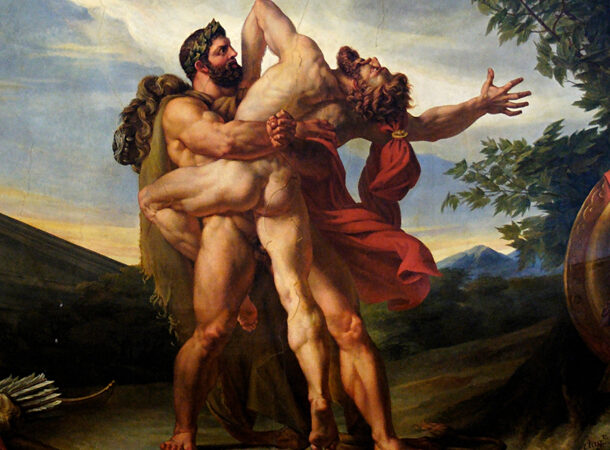 http://ancienthistory.about.com/cs/herculespeople/p/antaeus.htm
http://ancienthistory.about.com/cs/herculespeople/p/antaeus.htm You’ve definitely heard of Hercules, also known as Heracles, because of a cute little Disney movie that overlooked the fact that Pegasus wasn’t made of clouds. (He was created from the blood of death and monsters.) Hercules was a true hero, taking on everything and anyone and consistently winning. One such adversary was Antaeus, a giant who remained immortal as long as his feet touched the ground. Hercules searched for this giant, who unsurprisingly challenged him to a wrestling match. Hercules agreed, and the duel began. He soon discovered that if he threw the giant to the ground, he would simply regenerate. Hercules figured out what needed to be done and kept the giant in the air until his power diminished and the giant died.
Poseidon and Minos
 https://www.perseus.tufts.edu/Herakles/bull.html
https://www.perseus.tufts.edu/Herakles/bull.html As with typical gods, the chariot-riding god of the ocean and earthquakes is frequently found wreaking devastation on humanity. However, Poseidon was incredibly temperamental and often took out his little annoyances on entire towns of innocents, decimating thousands at the slightest irritation. Poseidon once commanded Minos, King of Crete, to sacrifice a particular bull he had brought up from the sea. Minos found the bull beautiful and did not want to sacrifice it, so he replaced it with an ordinary bull. Poseidon was enraged, and in retaliation, he cursed Minos’ wife to fall in love with the particular bull. In turn, Poseidon imbued the bull with rage, and it ravished Minos’ wife. The terrible Minotaur was born from their union, and Minos was forced to lock it up.
Birth of Athena
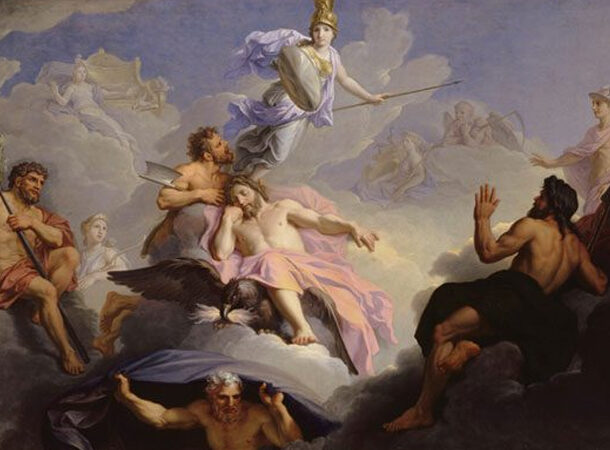 http://www.greekmythology.com/Myths/The_Myths/Birth_of_Athena/birth_of_athena.html
http://www.greekmythology.com/Myths/The_Myths/Birth_of_Athena/birth_of_athena.html Before marrying Hera, Zeus married a woman named Metis. She heard a prediction that her child would overthrow Zeus. Zeus, too, became aware of it and did the only natural thing: he tricked her into turning into a fly and swallowed Metis and the unborn baby whole. Unfortunately, after a while, Zeus developed terrible headaches. Hermes, who was a fairly brilliant man, advised Hephaestus to take a wedge and open Zeus’ skull – because apparently, that’s the best way to treat headaches. When they opened up Zeus’s head, a fully grown female warrior leaped out, fully armored. This was Athena, the goddess of intellect and wisdom.
Athena and Arachne
 http://myths.e2bn.org/mythsandlegends/textonly131-arachne-the-spinner.html
http://myths.e2bn.org/mythsandlegends/textonly131-arachne-the-spinner.html While we’re on Athena… Arachne, a talented seamstress, lived in the city of Athens. Her work was so beautiful that she often boasted that she was better than Athena, who was believed to be the best weaver in the world. When Athena heard this, she advised the girl to stop her tall tales. When she refused to listen, Athena challenged her to a weaving competition, hoping to take her down a notch or two. But Arachne didn’t just boast. When the weaving was finished, Athena saw that the tapestry she’d woven was perfect, more incredible than anything she’d ever made. In a rage, she cursed the girl, causing her to feel so guilty for what she had done that she committed suicide. Athena subsequently turned her into a spider so that she could weave for eternity.
Hermes and Chelone
 https://www.theoi.com/Olympios/HermesWrath.html#Khelone
https://www.theoi.com/Olympios/HermesWrath.html#Khelone Hermes, the messenger of the gods, is the god of several disciplines, including hospitality, herds, and travelers – to name a few. However, his penchant for thieving and mischief is less well-known. Although not as cruel as the other gods on this list, Hermes’ punishments frequently feel unjustified, making them particularly spiteful. As the gods’ messenger, Hermes was responsible for summoning everyone to witness Zeus and Hera’s wedding. However, a lazy mountain nymph named Chelone ignored Hermes’ summons and mocked the bride and groom. As punishment for missing his father’s wedding, Hermes destroyed Chelone’s home and transformed her into the first tortoise.
Prometheus
 https://www.greekmyths-greekmythology.com/prometheus-fire-myth/
https://www.greekmyths-greekmythology.com/prometheus-fire-myth/ Prometheus gave humans the gift of heat and light by stealing fire from the gods. Zeus was upset with Prometheus for his theft, but the god was more upset that someone would disobey his commands. Zeus shackled Prometheus to the edge of Mount Caucasus as retribution. But Zeus added a slight twist to his punishment; he didn’t only chain Prometheus. Each night, Prometheus’ liver was to be pecked out by an eagle on Zeus’s command. The eagle would then return and begin the process all over again after his liver regenerated.
Medusa
 https://greecetravelideas.com/medusa-and-athena-myth/
https://greecetravelideas.com/medusa-and-athena-myth/ Athena, the goddess of wisdom, is well-known for her insightful advice and assistance to heroes like Perseus and Heracles. Despite her positive reputation, Athena is possibly one of the most vindictive and unjust of the Olympian deities. Her punishments were frequently excessively harsh and inappropriate. One such terrible fate befell Medusa. Thanks to popular media, the world perceives Medusa as a pallid monster with snakes for hair and a gaze that can turn you to stone. However, Medusa wasn’t always a monster; she was actually a beautiful young woman. Such was her beauty that she caught the eye of Poseidon. One day, he followed her into Athena’s temple and violated her. Even though Medusa was the victim of a horrible crime, Athena punished her by transforming her into the famous snake-haired creature.
Leda
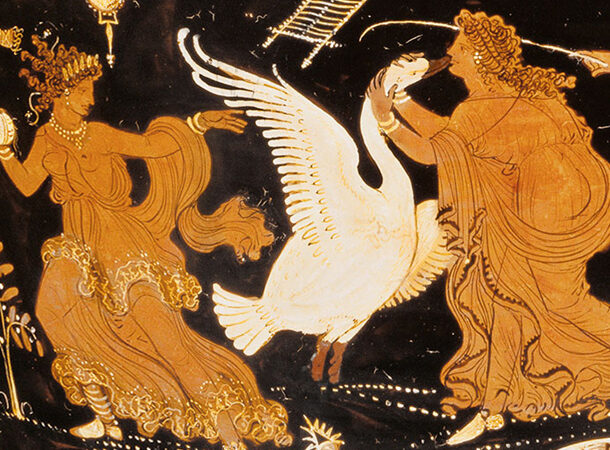 http://www.greekmythology.com/Myths/Mortals/Leda/leda.html
http://www.greekmythology.com/Myths/Mortals/Leda/leda.html Throughout mythology, Zeus sleeps with almost everyone: gods, demigods, humans, animals, and even with mortals while disguised as animals. One of the oddest fables involving this behavior is the story of Leda and the swan . In the narrative, Zeus sees Leda and adores her from afar. He then changes into a swan to seduce her – and succeeds. How he seduced her as a swan is a mystery – and it’s one we’re not sure we want to know. The two mated, and two sets of twins were born. One of the children, born from an egg, was named Helen. Helen of Troy. Yes, THE Helen of Troy, who was said to be the most beautiful woman alive.
Lycurgus
 http://www.theoi.com/Heros/Lykourgos.html
http://www.theoi.com/Heros/Lykourgos.html Remember the whole theme of never provoking the gods? Lycurgus could have used a reminder of that, as he was punished in one of the worst ways possible. According to legend, Dionysus was on a wine tour of the mortal world when Lycurgus attacked him – in the process, hurting the beloved wine god. The gods punished Lycurgus by making him insane. Amid his madness, Lycurgus saw his son and was convinced he was a weed or a vine that needed clipping. He slaughtered his son and the rest of his family with an axe. Some legends claim that after that, he hacked off his own legs with the same axe as one might in a moment of insanity.
Leto
 https://www.theoi.com/Titan/TitanisLeto.html#:~:text=LETO%20was%20one%20of%20the,of%20modesty%20and%20womanly%20demure.
https://www.theoi.com/Titan/TitanisLeto.html#:~:text=LETO%20was%20one%20of%20the,of%20modesty%20and%20womanly%20demure. It is only fitting that the mother of Apollo and Artemis appears alongside her divine children on this list of creepy tales. The titan goddess usually appears as the victim of Hera, the queen of the gods, when it comes to mythological legends. Leto did, however, dish out quite a few of her own cruelties, just like her children. One such target of Leto’s rage was Niobe, the queen consort of Thebes. Niobe gave birth to seven sons and seven daughters. Niobe boasted that she had raised many more children than Leto, who had raised only two. As such, Leto encouraged her glorious children to kill Niobe’s children in response to her pride, which she found insulting. Artemis dealt with the daughters, while Apollo dealt with the sons, and the grieving Niobe asked to be turned to stone.
Aphrodite
 https://www.theoi.com/Olympios/AphroditeWrath.html#Lemnides
https://www.theoi.com/Olympios/AphroditeWrath.html#Lemnides Since romantic relationships can be turbulent and cruel, it makes sense that the goddess of love frequently lashes out at those who offend her with severe punishments. Like many gods, Aphrodite does not tolerate disrespect, especially when humans demonstrate it. That said, her wrath is almost too cruel. When the women from the island Lemnos refused to pay homage to her, she cursed them all with offensive body odor. Their men on the island subsequently lost interest in them and began substituting their slaves for their wives. The women were so furious that they responded by killing their fathers and husbands. Thousands of lives were lost because Aphrodite didn’t feel appreciated.
Tantalus
 http://www.greekmyths-greekmythology.com/the-myth-of-tantalus/
http://www.greekmyths-greekmythology.com/the-myth-of-tantalus/ The story of Tantalus provides unequivocal evidence that the gods had a particularly repulsive sense of humor. Tantalus was a frequent visitor to Mount Olympus in life, but the gods didn’t really like him as a guest. In addition to serving the gods meat from his son’s corpse rather than a proper feast, he stole ambrosia and then gave it to his other human friends and acquaintances. The gods punished him by imprisoning him in the deepest parts of Tartarus (the deep abyss used for torturing the wicked). There, he would spend eternity under the shade of fruit trees and immersed in water. When he reached for the fruit, the trees would draw away from him, and anytime he tried to drink, the water would move away from him. As such, he would always be hungry and thirsty, and everything he desired would be just out of his reach.
Ixion
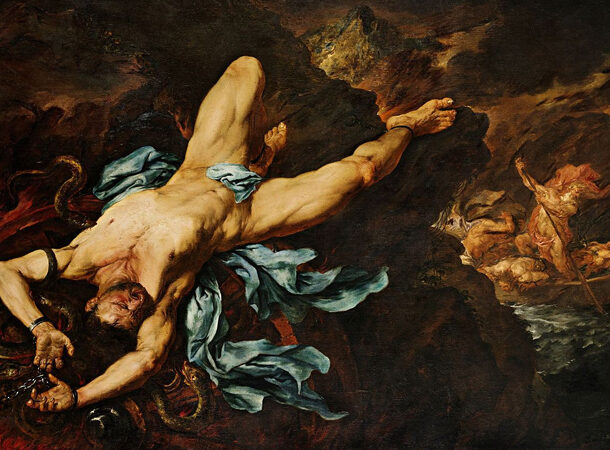 http://www.pantheon.org/articles/i/ixion.html
http://www.pantheon.org/articles/i/ixion.html According to legend, Ixion was in exile for his crimes against other humans when Zeus showed him mercy and extended an invitation to stay at Mount Olympus. When he arrived, he noticed Hera and became obsessed with seducing her. Zeus created a cloud-based imitation of Hera, which Ixion successfully impregnated. Yes, very creepy, but let’s not get into the technicalities. We only know that Zeus punished Ixion by binding him to a burning wheel because he became angry. And what of his child? He was known as Centaurus, and after mating with a couple of horses, the mythological creature known as the centaur – half man, half horse – was born. Those centaur scenes in Harry Potter have a different flavor now, don’t they…
Appollo and Cassandra
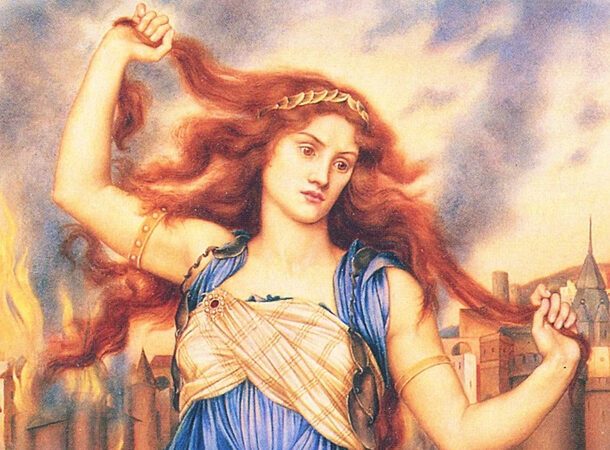 https://www.greeklegendsandmyths.com/cassandra.html
https://www.greeklegendsandmyths.com/cassandra.html Although the son of Zeus has a reputation for being oppressive and a harsh punisher of the wicked, he has a control issue regarding the fairer sex. Apollo is frequently seen pursuing women, driven by the ferocious libido he inherited from his father. Sadly, he typically responds to rejection in a less-than-desirable manner, to put it mildly. Apollo gave Cassandra, his latest obsession, the gift of prophecy to win her over. Although appreciative, Cassandra did not want to spend the night with the god. Bitter about the rejection, Appollo ensured that no one would ever believe Cassandra’s prophesies – even though they were true. As a result, Cassandra saw the fall of Troy but had no way to warn anyone. After Troy’s destruction, she was captured, assaulted, and ultimately killed.
Erysichthon
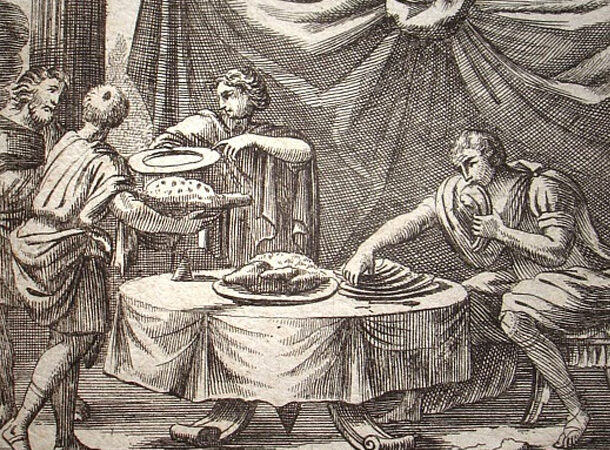 http://www.theoi.com/Heros/Erysikhthon.html
http://www.theoi.com/Heros/Erysikhthon.html We’re taking a look at the tale of Erysichthon at number 7 on our list today to bring home the idea of never provoking the gods. The man in question was extremely wealthy and greedy and didn’t give the gods much thought. One day, as the rich are wont to do, he decimated a sacred grove of trees to construct another feast hall. This infuriated Demeter, who resolved to punish him. She gave him such a voracious appetite that he devoured everything. He consumed all the food he had, and then all the food he could afford, until he had spent all of his money. He even tried to sell his own daughter to get more food. He eventually became destitute and lost his status, house, friends, and everything that goes with it. When he ran out of options, he turned on himself – literally – and died while consuming his own flesh.
Hera
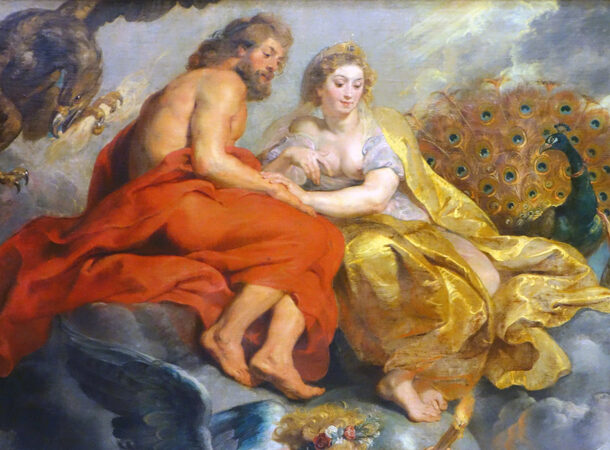 https://www.greek-gods.info/greek-gods/hera/
https://www.greek-gods.info/greek-gods/hera/ Everyone loves a day at the spa. Hera, however, loved it a bit too much. Hera would go to the Spring of Kanathos in Nauplia once a year and have a delightful, lovely, unwinding bath. But she would also magically restore her virginity while enjoying herself, unwinding, and taking said bath. This means that Hera remained a virgin, regardless of how many men she shared a bed with, even her own husband. And given Zeus’ voracious sexual appetite, who could blame her if she had her own fun on the side? But the story doesn’t end there. Mortals would literally bathe sculptures of her to help her recover her virginity, often before important social gatherings, as a form of respect.
Artemis and Aura
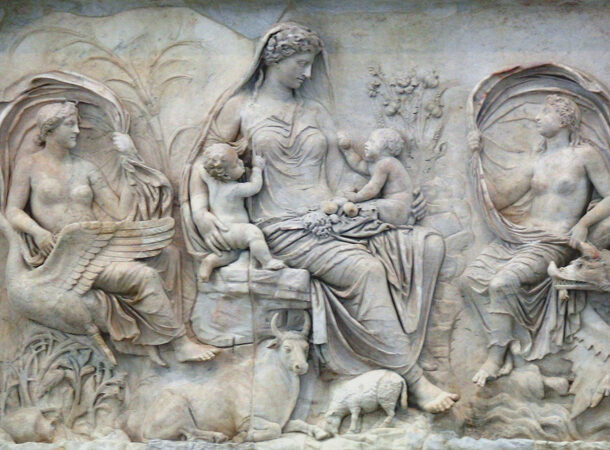 https://www.theoi.com/Titan/Aura.html
https://www.theoi.com/Titan/Aura.html The goddess of hunting and guardian of young girls was not afraid of doling out harsh punishments. Her brother Apollo was notorious for punishing individuals who turned down his advances. On the other hand, Artemis’ fury was virtually polar to Apollo’s and was mainly limited to those who made advances on her and offended her virginity. As a virgin goddess, such offenses were punished with a vengeance. Aura, the virgin goddess of the breeze, once approached Artemis while bathing. When she saw Artemis bathe, she thought her form was too womanly for a virgin. Aura boasted arrogantly for a long time that her more manly body made her the superior virgin goddess. In response to Aura’s defamation, Artemis arranged for the god Dionysus to violate her and destroy her chastity. The experience drove Aura to madness, leading to her devouring her twins after their birth before casting herself into the sea.
Hera and Heracles
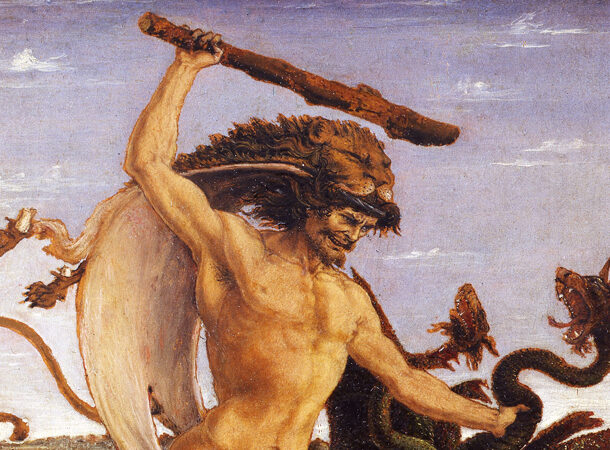 https://classicalwisdom.com/mythology/heracles-and-hera/
https://classicalwisdom.com/mythology/heracles-and-hera/ William Congreve said it best when he told us about hell, and the fury of a woman scorned. Hera, the queen of the gods, is notorious for harboring petty grudges against all the women her husband has been with. In fact, no other god comes close to her when it comes to the severity of the punishments she metes out to these women and their unborn children. Heracles was one of Zeus’ illegitimate children, so Hera couldn’t stand him. She dispatched two snakes to suffocate Heracles while he was a baby. Hera also cursed Heracles, at that point a husband and a father, with madness, driving him to kill his wife and children. As penance for his deeds, Heracles undertook his twelve labors, and even then, Hera caused the hero significant strife and injury by interfering.
Birth of Dionysus
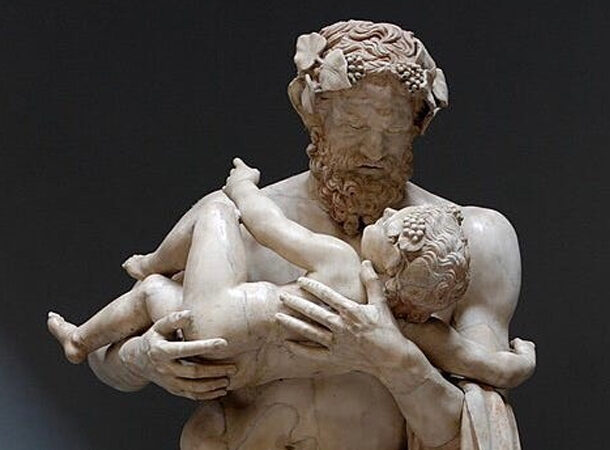 http://www.greek-gods.info/greek-gods/dionysus/myths/dionysus-birth/
http://www.greek-gods.info/greek-gods/dionysus/myths/dionysus-birth/ Greek mythology is full of bizarre births, but Dionysus, the god of wine and celebration, had one of the creepier ones. It all began with Zeus, who, yet again, couldn’t refrain from seducing a mortal princess. Semele became pregnant with his child. As usual, Zeus’ wife, Hera, took offense and decided to do something about the situation. She planted doubt in Semele’s mind, and eventually, Semele pleaded to see Zeus in his entirety to be certain that he truly did exist and that he loved her. Zeus was obligated to fulfill his commitment, under which he promised to do anything for her. Naturally, when anyone gazed upon Zeus in his entirety, they would die, and sadly, the princess was engulfed in fire. But, despite losing his lover, Zeus was committed to protecting the unborn child. So, he took the baby from her womb and placed him inside his thigh. There, he kept him until the child was ready to come into the world.
Pan
 http://www.greek-gods.info/monsters/satyrs/pan/myths/pan-syrinx/
http://www.greek-gods.info/monsters/satyrs/pan/myths/pan-syrinx/ Pan is, in general, one of the creepiest gods there ever was. Some tales claim that Penelope, Odysseus’s wife, gave birth to him, while others suggest that a nymph or possibly Aphrodite herself was involved. He was well known for tending to his sheep and occasionally engaging in sexual activity with them as well as for wanting to get with pretty much any female he ever saw. One of these nymphs, Syrinx, wasn’t particularly receptive to Pan’s advances and escaped. She was pursued through the woods by the ominous half-man, half-goat figure and eventually grew so upset that she asked a river deity to change her into a group of reeds, which (she believed) Pan would never lust after. But Pan was so insistent about having her that he decided to carry a piece of her everywhere. He fashioned a flute, known today as the pan flute, out of the reeds and ensured that his lips stayed on her for all eternity.
Kronos
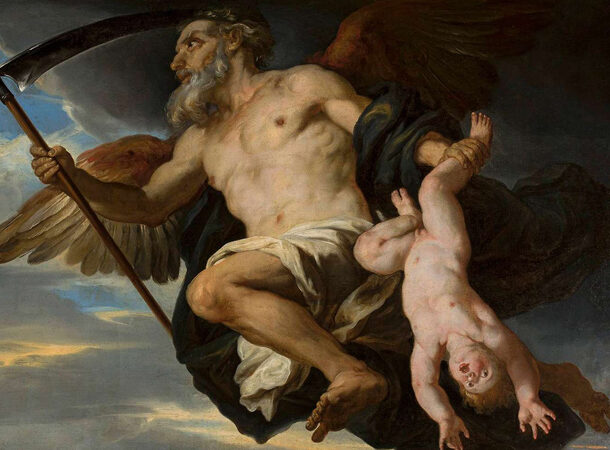 http://historylink101.com/2/greece2/titans.htm
http://historylink101.com/2/greece2/titans.htm Back at the beginning of time, according to Greek mythology, there was a Titan named Kronos or Cronus. He was the son of Ouranos, commonly known as The Sky, and married to the goddess Rhea. Kronos was power-obsessed in the worst way and ultimately castrated his father to establish himself as the leader. He then ate all of his children because he was afraid one of them would overthrow him. Well, almost all his children. He left his son Zeus – who, funnily enough, eventually defeated him. And by “defeated,” we mean Zeus matured, went after Kronos, and made him vomit up all the gods he’d devoured throughout the years. The gods were still alive, and a great war raged between them and the Titans for about a decade, with Zeus and his siblings eventually triumphing.



























